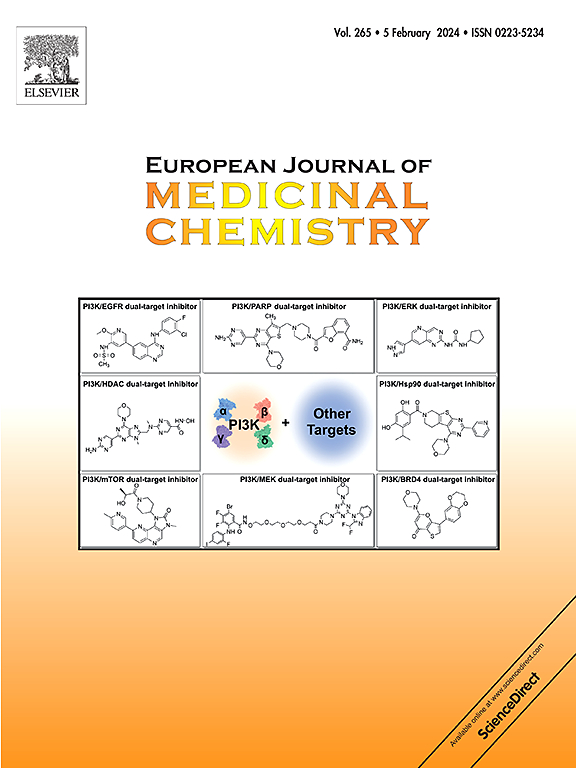KRASG12D选择性VHL-PROTAC与保留KRASWT和其他KRAS突变体
IF 6
2区 医学
Q1 CHEMISTRY, MEDICINAL
引用次数: 0
摘要
KRASG12D是各种癌症中最普遍的KRAS突变体。我们报道了KRASG12D选择性PROTAC, CH091138(6),通过SAR研究鉴定。6选择性降解外源性和内源性KRASG12D,但不能降解KRASWT或其他KRAS突变体。此外,全球蛋白质组学分析显示,KRAS在AsPC-1细胞中下调最为显著。机制研究表明,降解依赖于vhl介导的泛素-蛋白酶体系统。通过NMR研究确定了6的结合位点,对接研究解释了6介导的KRASG12D与VHL之间的相互作用导致了KRASG12D的选择性。6抑制含有KRASG12D的结肠癌患者源性类器官(PDOs)的增殖,而不抑制含有KRASWT的PDOs的生长。值得注意的是,6可以降低AsPC-1异种移植小鼠模型中的肿瘤生长。总的来说,我们报道了KRASG12D选择性PROTAC,并提出了选择性的潜在假设。此外,我们的研究表明,protac介导的KRASG12D降解是一种有吸引力的抗癌策略。本文章由计算机程序翻译,如有差异,请以英文原文为准。


KRASG12D selective VHL-PROTAC with sparing KRASWT and other KRAS mutants
KRASG12D is the most prevalent KRAS mutant in various cancers. We report the KRASG12D selective PROTAC, CH091138 (6), identified through SAR studies. 6 selectively degrades exogenous and endogenous KRASG12D but not KRASWT or other KRAS mutants. Furthermore, global proteomic analysis shows that KRAS is most significantly downregulated in AsPC-1 cells. Mechanistic studies reveal that the degradation depends on the VHL-mediated ubiquitin-proteasome system. The binding site of 6 was identified by NMR studies, and docking studies explain 6-mediated interaction between KRASG12D and VHL leads to KRASG12D selectivity. 6 suppresses the proliferation of AsPC-1 cells and the growth of colon cancer patient-derived organoids (PDOs) harboring KRASG12D but not PDOs with KRASWT. Notably, 6 reduces tumor growth in an AsPC-1 xenograft mouse model. Collectively, we report KRASG12D selective PROTAC and propose potential hypotheses for the selectivity. Also, our study reveals that PROTAC-mediated degradation of KRASG12D is an attractive anti-cancer strategy.
求助全文
通过发布文献求助,成功后即可免费获取论文全文。
去求助
来源期刊
CiteScore
11.70
自引率
9.00%
发文量
863
审稿时长
29 days
期刊介绍:
The European Journal of Medicinal Chemistry is a global journal that publishes studies on all aspects of medicinal chemistry. It provides a medium for publication of original papers and also welcomes critical review papers.
A typical paper would report on the organic synthesis, characterization and pharmacological evaluation of compounds. Other topics of interest are drug design, QSAR, molecular modeling, drug-receptor interactions, molecular aspects of drug metabolism, prodrug synthesis and drug targeting. The journal expects manuscripts to present the rational for a study, provide insight into the design of compounds or understanding of mechanism, or clarify the targets.

 求助内容:
求助内容: 应助结果提醒方式:
应助结果提醒方式:


